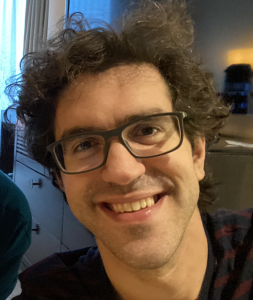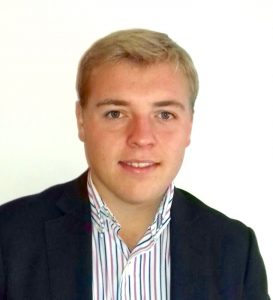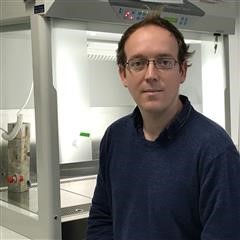By Alina Shrourou, on 29 June 2022
In this interview as part of the Early Career Innovators series, recognising the amazing translational work being done by postdocs and non-tenured researchers at University College London (UCL), Dr Mariana Diniz highlights her Cell and Gene Therapy Therapeutic Innovation Network (TIN) Pilot Data Fund awarded project, developing a cell therapy based on Natural Killer cells to treat liver cancer. Read the rest of this entry »
By Alina Shrourou, on 16 June 2022
Top tips to communicate research to people living or caring for someone with a health condition. From early lab-based research all the way to new treatments and service improvements, you will gain valuable insights that benefit you, your research and ultimately patients and their carers.
Authors: Nordia Willis1, Iyamide Thomas2, Edwin Carr3 and Linda von Nerée3 Read the rest of this entry »
By Alina Shrourou, on 30 May 2022
In this interview as part of the Early Career Innovators series, recognising the amazing translational work being done by postdocs and non-tenured researchers at University College London (UCL), Dr Olga Kopach highlights her Regenerative Medicine Therapeutic Innovation Network (TIN) Pilot Data Fund awarded project, investigating the therapeutic potential of medicine encapsulation for treating chronic pain and nerve regeneration. Read the rest of this entry »
By Alina Shrourou, on 27 April 2022
In this interview as part of the Early Career Innovators series, recognising the amazing translational work of postdocs and non-tenured researchers at University College London (UCL), Dr Sarah Massey highlights her Devices & Diagnostics Therapeutic Innovation Network (TIN) Pilot Data Scheme awarded project involving the use of a mobile app to manage spasticity symptoms. Read the rest of this entry »
By Alina Shrourou, on 22 March 2022
In this interview as part of the Early Career Innovators series, recognising the amazing translational work being done by postdocs and non-tenured researchers at University College London (UCL), Dr Annalucia Darbey and Dr Charlotte Spicer highlight their joint Cell and Gene Therapy Therapeutic Innovation Network (TIN) Pilot Data Fund awarded project, investigating the comparison of novel gene therapies to treat an inherited neurodegenerative disorder. Read the rest of this entry »
By Alina Shrourou, on 15 March 2022
In this interview as part of the Early Career Innovators series, recognising the amazing translational work being done by postdocs and non-tenured researchers at University College London (UCL), Dr Ariel Finkielsztein highlights his Regenerative Medicine Therapeutic Innovation Network (TIN) Pilot Data Scheme awarded project involving the production of induced pluripotent stem cells (iPSC) for lung regeneration. Read the rest of this entry »
By Alina Shrourou, on 7 March 2022
In this interview as part of the Early Career Innovators series, recognising the amazing translational work being done by postdocs and non-tenured researchers at University College London (UCL), Dr Amy Richardson highlights her Cell and Gene Therapy Therapeutic Innovation Network (TIN) Pilot Data Fund awarded project based on testing a novel gene therapy for epilepsy. Read the rest of this entry »
By Alina Shrourou, on 1 March 2022
In this interview as part of the Early Career Innovators series, recognising the amazing translational work being done by postdocs and non-tenured researchers at University College London (UCL), Dr Apostolos Papandreou highlights his Small Molecules Therapeutic Innovation Network (TIN) Pilot Data Fund awarded project, involving novel drug development for a genetic neurodegenerative disorder.
What is the title of your project and what does it involve?
The title of my project is ‘Development of novel autophagy inducers for the treatment of Beta-Propeller Protein-Associated Neurodegeneration (BPAN)’. It involves developing new drugs for a rare, devastating, life-limiting neurodegenerative disorder: Beta-Propeller Protein-Associated Neurodegeneration (BPAN).
In my previous work, I performed a drug screen and identified promising drugs that ‘treat’ BPAN nerve cells in the laboratory. Namely, I developed a brain model of BPAN; I converted patients’ skin cells into ‘stem cells’, which have the capacity to transform into any cell type in the body. I then manipulated these stem cells to create a specific type of brain cell (known as “dopaminergic neurons”) that are significantly affected in BPAN. I utilised this laboratory model (our “disease-in-a-dish”) to understand disease processes and confirmed that a crucial waste disposal and recycling system (termed ‘autophagy’) is defective.
I tested thousands of drugs for their capacity to treat BPAN in the dish – using both approved drugs, and others still under development. I successfully identified several promising drugs that restore autophagy in BPAN. I now want to test derivatives of the most promising of these drugs further, to identify ones with improved qualities, that can in turn be taken forward to future studies on other preclinical models and, ultimately, to a clinical trial.
What is the motivation behind your project/therapeutic?
BPAN is a recently identified genetic condition, emerging as the commonest form of a group of disorders known as childhood-onset Neurodegeneration with Brain Iron Accumulation (NBIA). Affected children initially present with delayed development, seizures and behavioural difficulties. A second devastating illness phase manifests in teenage years or early adulthood, with an irreversible decline in abilities (loss of independent walking and talking) and dementia. There is an urgent translational need to better understand BPAN and develop effective treatments for it.
At Great Ormond Street Hospital, we have established a nationally-recognised clinical service for children with BPAN, as well as a programme of important laboratory research at UCL. Since 2016, we have been working towards better understanding the processes causing BPAN in order to develop effective therapies.
I now plan to further develop novel drugs that have the capacity to ‘treat BPAN in the dish’, with the ultimate goal to translate these novel therapies into the clinic for my BPAN patients.
Why did you want to apply to the Small Molecules TIN Pilot Data Scheme?
The Small Molecules TIN is an excellent platform of drug development therapeutic innovation, into which my project and research fits really well. I am an early career researcher, and the fund was addressed to people at this career stage. Moreover, I have been working within UCL over the last few years in order to develop small molecule therapies for BPAN. UCL collaborators (from the TRO Drug Discovery Group) have now created derivatives of the most promising small molecules I identified in my previous work. My plans to further test, validate and develop these molecules not only build on my previous work and hold potential for translational therapeutic benefit, but promote intra-UCL collaborations between institutes, departments, and groups. For all these reasons, I feel that the Small Molecules TIN Pilot Data Scheme will be a very suitable springboard for future therapeutic development for BPAN, and also for my development as an academic clinician with a translational focus.
How did you find the process for the TIN Pilot Data Fund? What did you learn?
This process has been a very enjoyable and educational experience. The application was well advertised and straightforward, and the form easy to fill in and to the point. Importantly, as part of the application process and interview preparation, I had the chance to attend the associated ACCELERATE training workshop. This interactive workshop taught me to better pitch my research ideas in a way that my audience can understand; it was also very useful in improving my PowerPoint presentation skills. Hints and tips were given throughout, and it was nice to work interactively with other people in similar career stages within UCL. Overall, I think the whole process is an excellent opportunity for early career researchers looking for translational funding opportunities.
What do you hope to achieve in the 6 months duration of your project?
I hope to test the new drug derivatives, and identify ones that work well in ‘treating BPAN’ in the dish but are also effective in much smaller concentrations. These can then be tested in other models, as appropriate, prior to clinical trials. I also hope to better elucidate the mechanism of action of these compounds, which would be interesting in its own, but would also shed light into the pathophysiological mechanisms leading to disease in BPAN.
What are your next steps from now?
After the TIN project, promising candidate molecules will be tested in BPAN 3-D ‘mini-brains’ that I am concurrently developing in the lab, and/ or a mouse model of BPAN that I am also aiming to establish with help of international and intra-UCL collaborators. Discussions with MHRA will guide my steps to progression towards the clinic. My ultimate goal is to develop disease modifying/curative treatments for BPAN. I also aim to become an independent clinician scientist, with a particular interest in paediatric neurometabolic disorders and a bench-to-beside approach to developing novel therapeutics for my patients.
About Apostolos Papandreou 
Dr Apostolos Papandreou was born in Greece in 1981. He studied medicine there, and subsequently moved to the UK in 2007. He had all his postgraduate paediatric training and then underwent paediatric neurology subspecialty training at Great Ormond Street Hospital, London (2013-2021). His PhD studies were on novel therapeutic development for rare disorders (PhD, University College London 2020).
He is now an NIHR BRC Catalyst fellow at UCL (Great Ormond Street Institute of Child Health), continuing his research in neurometabolic and neurodegenerative conditions with a focus on developing new, disease-specific treatments; he is also an honorary Paediatric Neurology Consultant at the Evelina London Children’s Hospital (Complex Motor Disorders Service).
By Alina Shrourou, on 21 February 2022
In this interview as part of the Early Career Innovators series, recognising the amazing translational work being done by postdocs and non-tenured researchers at University College London (UCL), Dr Matthew Wilcox highlights his Devices and Diagnostics Therapeutic Innovation Network (TIN) Pilot Data Fund awarded project, BANTER (Blood biomarker Assessment of Nerve Trauma and Early Reinnervation).
What is the title of your project and what does it involve?
BANTER (Blood biomarker Assessment of Nerve Trauma and Early Reinnervation), involves the development of a blood test which hopes to improve nerve injury identification. This study will use the SIMOATM Neurofilament Light (NfL) chain assay which has been tried and tested in capturing changes associated with a number of diseases of the brain and/or spinal cord such as Alzheimer’s disease and Traumatic Brain Injury. For the first time, this project will repurpose this technology to determine whether it is possible to detect the presence and severity of nerve injury using a well-established animal model. This will involve a collaboration between the UCL Centre for Nerve Engineering and UK Dementia Research Institute Fluid Biomarker Laboratory.
What is the motivation behind your project/therapeutic?
Nerve injuries often lead to permanent loss of movement and pain leading to significant quality of life impairments for patients. It currently takes too long for nerve injuries to be identified and referred for assessment by clinicians with special expertise in this area who may be able to offer surgery to improve outcome. In many cases, this means many patients suffer worse outcomes than had earlier referral been made. A major reason for this is because swift identification of nerve injuries depends on patients being able to access facilities with expensive imaging and tests which measure the electrical properties of nerves (such as MRI scans and Electromyography). Even if patients are able to access this technology, clinicians often find them difficult to interpret.
This project addresses this issue by developing a cheaper, readily available and objective test which may be able to predict the presence and severity of a nerve injury from a small blood sample.
Why did you want to apply to the Devices & Diagnostics TIN Pilot Data Fund?
A challenging step in transitioning from an early career researcher to an independent investigator is turning research ideas into compelling grant proposals. The TIN Pilot Data Fund provided an invaluable opportunity to develop a research idea right the way from planning and costing the experiment through to pitching to academics and industry representatives. This funding will provide the data necessary to design larger studies and help establish my research identity.
How did you find the process for the TIN Pilot Data Fund?
Throughout the application process, support was provided through the ACCELERATE training workshops which focused on developing communication and presentation skills. This experience has helped me to understand how to develop convincing pitches to different members of the academic and industry community; a skill that will be essential in my next career steps towards a surgeon-scientist.
What do you hope to achieve in the 6 months duration of your project?
We will reach the first milestone of our project in 6 months. The success criteria of this will be to show the validity of the SIMOATM Neurofilament Light (NfL) chain assay in identifying the presence and severity of nerve injury in a controlled animal model. Alongside this laboratory-based research, I will be working closely with clinical colleagues at the Royal National Orthopaedic Hospital to design a corresponding study in nerve injured patients.
What are your next steps from now?
I hope to move into full time clinical training as a Foundation Doctor from August 2022 with the long term view of becoming a reconstructive surgeon-scientist. I am excited by the challenges I will encounter within the clinical arena along the way and look forward to addressing some of these by continuing to work closely with the diverse research community that UCL offers.

About Dr Matthew Wilcox
Dr. Matthew Wilcox is a Research Fellow at the UCL School of Pharmacy and a final year UCL medical student. In 2020, Matt was awarded a PhD in Translational Neuroscience which benefited from a collaboration between the Peripheral Nerve Injury Unit, Royal National Orthopaedic Hospital (a national referral centre for nerve injury) and the UCL Centre for Nerve Engineering.
Matt works within an interdisciplinary team focused on providing novel insights into the cellular and molecular basis of human nerve regeneration, developing improved imaging-based outcome measures of nerve regeneration and diagnostic tools for nerve injury. Together, this is informing the development of clinical trials which hope to test the efficacy of regenerative therapies for nerve injury and disease.
By Alina Shrourou, on 11 August 2021
In this Regenerative Medicine TIN interview as part of the Early Career Innovators series, recognising the amazing translational work being done by postdoc and non-tenured researchers within the UCL Therapeutic Innovation Networks (TINs), Dr Charlie Arber highlights his Regenerative Medicine TIN Pilot Data Fund awarded project, involving the potential of stem cells in Alzheimer’s.
What is the title of your project and what does it involve?
The Regenerative Medicine TIN have supported my project titled “Cell therapy in Alzheimer’s disease”. This is a project to understand the potential of stem cell derived astrocytes in repairing the brain in the dementia. Astrocytes are brain support cells, capable of cleaning the brain and even replacing some of the cells that degenerate in disease.
The project will answer three questions:
- Can human astrocytes interact with mouse brain slice cultures?
- Can astrocytes change the inflammatory state of the brain?
- Can astrocytes sense and respond to amyloid (the main pathology in Alzheimer’s disease)?
What is the motivation behind your project/therapeutic?
There remain no therapies to slow, reverse or prevent dementia. In 100 years, how will we treat dementia? Possibly by replacing the cells that have degenerated? Like Luke Skywalker’s hand? This project is a first step to understand the value of astrocytes in cell replacement therapy in Alzheimer’s disease.
Can you highlight any challenges have you experienced as an early career researcher in the regenerative medicine/translational research space?
I am a basic scientist. I think understanding the importance of basic biology in translational science is under-appreciated. All basic scientists should have translational goals. This is the major impact of our work.
I have found keeping an eye on the larger picture and the long term goals a challenging aspect to my career. Small pilot grants such as the initiatives from the TINs have an invaluable role in supporting this type of research.
Why did you want to apply to the Regenerative Medicine TIN Pilot Data Fund?
It is often hard to generate the pilot data that is required to apply for large grants and fellowships. I applied to the Regenerative Medicine TIN Pilot Data Scheme to learn a new technique (organotypic slice culturing) that has enabled me to generate new data which will be central to my fellowship applications and my career progression.
Join the Regenerative Medicine TIN to be the first to hear about similar opportunities
How did you find the process for the TIN Pilot Data Fund? What did you learn?
I found the application process straight forward. Before the dragon’s den style interview, we had interview/pitch training from a professional coach, provided through ACCELERATE. I received some really useful feedback, especially in conveying a message in just two slides and 5 minutes.
Learn more about the training offered through ACCELERATE Success
Since the project began, I have had useful experience in budgeting for a small grant and deadline management due to the short, 6 month nature of these projects (as well as COVID-related setbacks!).
What do you hope to achieve in the 6 months duration of your project?
Having had this opportunity and support from the Regenerative Medicine TIN, I have generated some interesting and exciting pilot data. I am now looking forward to building on these findings as a major thread of my research career. I really look forward to driving this research question forward.
About Dr Charlie Arber

Charlie Arber is a stem cell biologist. He has worked with human stem cells for 15 years, understanding the best ways to make brain cells in a dish and using stem cells from patients to investigate the earliest causes of dementia.
Charlie is a senior research fellow in the department of neurodegenerative disease at the Institute of Neurology. His current research focus is looking at the role of brain inflammation in early onset Alzheimer’s disease.
 Close
Close





